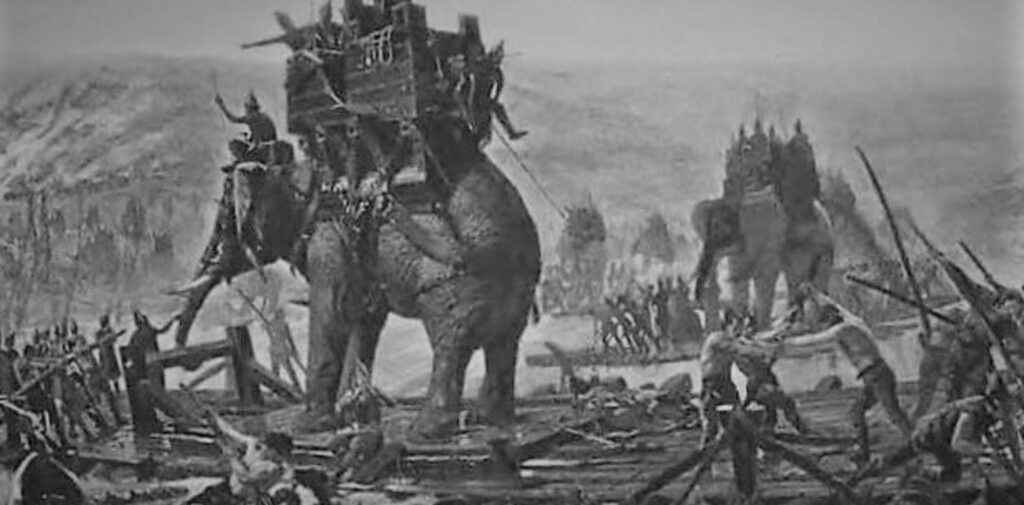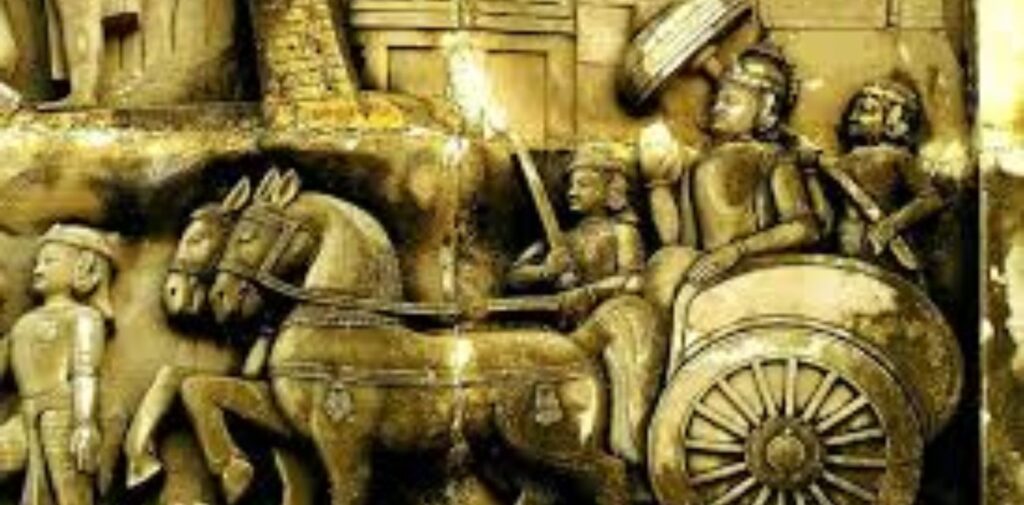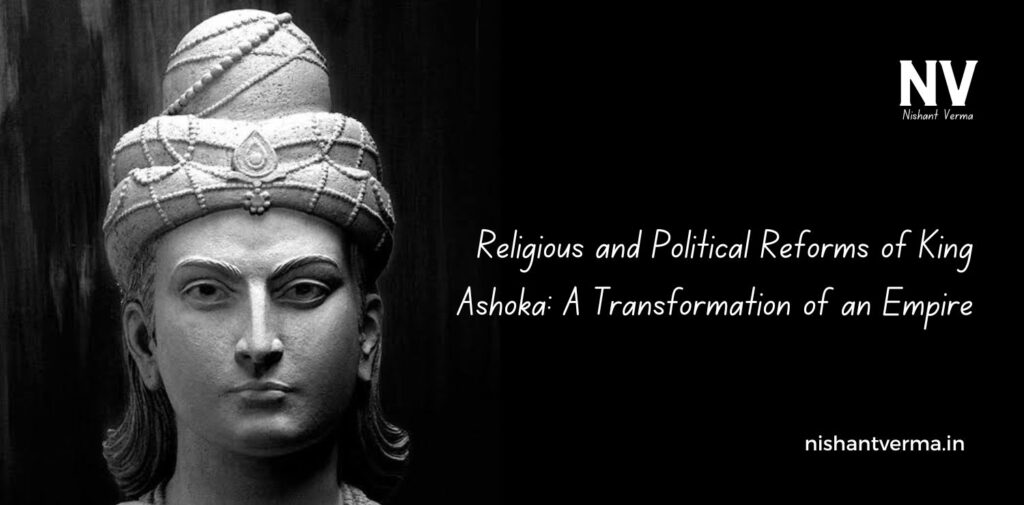King Ashoka, one of the most prominent and well-known rulers in Indian history, is remembered not only for his political leadership but also for his profound religious and social reforms. Ascending the throne of the Maurya Empire around 268 BCE, Ashoka’s reign marks a significant turning point in Indian history. He was initially a warrior king, known for his conquests, but after the bloody Kalinga War, Ashoka’s heart and policies underwent a drastic transformation. This article delves into the religious and political reforms that Ashoka introduced, which helped shape the direction of his empire and left a lasting legacy in the history of India and beyond.
Ashoka’s Early Life and the Kalinga War
Ashoka, born in 304 BCE, was the third ruler of the Maurya dynasty. He inherited a vast empire from his grandfather, Chandragupta Maurya, and his father, Bindusara. Ashoka initially gained a reputation as a fierce and ambitious ruler, expanding his empire through military conquest. His most notable military campaign was the Kalinga War (circa 261 BCE), which was fought against the kingdom of Kalinga, located in present-day Odisha.
The battle was brutal and resulted in massive loss of life, with tens of thousands of soldiers and civilians killed or wounded. The sheer scale of death and destruction deeply affected Ashoka. Witnessing the suffering caused by the war, he became remorseful and vowed to never again pursue war through violence. This marked a significant shift in his mindset, one that would shape both his political and religious reforms.

Religious Reforms: Embracing Buddhism
After the Kalinga War, Ashoka embraced Buddhism, a decision that transformed his rule and had a profound impact on the entire Indian subcontinent. While he was initially a follower of Hindu practices, he turned to Buddhism after his conversion, becoming one of its greatest patrons.
- Promotion of Buddhist Principles: Ashoka became a firm believer in the moral teachings of Buddhism, particularly the concepts of non-violence (ahimsa), tolerance, compassion, and respect for all living beings. He sought to implement these principles not just in his personal life but also as the guiding values for his empire. Ashoka’s conversion to Buddhism is sometimes referred to as a “spiritual revolution,” as it represented a dramatic departure from the usual political behavior of monarchs at the time, who often relied on military power to enforce their rule.
- Spread of Buddhism: Ashoka made significant efforts to spread Buddhism both within his empire and abroad. He sent missions to neighboring countries such as Sri Lanka, Nepal, Myanmar, and Central Asia, where Buddhist teachings were established and flourished. Ashoka’s efforts helped make Buddhism one of the world’s major religions. His support for Buddhism was not limited to India; he sent missionaries to distant lands, including Greece, Egypt, and South-East Asia, to spread the teachings of the Buddha.
- Building Buddhist Monuments: Ashoka is known for commissioning the construction of numerous stupas, viharas (monasteries), and pillars inscribed with Buddhist edicts across his empire. These monuments served as places for meditation, learning, and religious gatherings. The most famous of these is the Sanchi Stupa, which stands as a symbol of his support for Buddhism. These structures not only provided physical spaces for Buddhist practice but also served as visual reminders of his reign and commitment to non-violence and moral living.
- The Edicts of Ashoka: Perhaps the most enduring legacy of Ashoka’s religious reforms are his edicts, which were inscribed on large stone pillars and rocks throughout his empire. These edicts contain Ashoka’s teachings on ethics, religion, and governance, encouraging people to adopt values such as kindness, respect for elders, tolerance of different religions, and compassion for all living beings. His famous Brahmi script inscriptions are found in places such as Delhi, Kalinga, and Bhopal, and they provide valuable insight into his ideas and vision for the empire.

Political Reforms: A Focus on Welfare and Justice
In addition to his religious transformation, Ashoka also introduced several important political reforms, which were based on his newfound commitment to ethical governance and the well-being of his people.
- Centralized Governance with Welfare Focus: Ashoka’s empire, which stretched from modern-day Afghanistan to Bangladesh, was vast, and managing such a large territory required an effective administrative system. Ashoka focused on creating a centralized, efficient governance system that could provide for the welfare of his people. He established a system of officials known as Dhamma Mahamattas, who were responsible for overseeing the implementation of moral and ethical codes in the empire. These officials were tasked with spreading Ashoka’s ideas of Buddhism, ensuring justice, and overseeing public works, including infrastructure projects.
- Social Reforms and the Dhamma Code: One of Ashoka’s most significant political reforms was the promotion of the Dhamma, a moral code inspired by Buddhist teachings. The Dhamma emphasized values such as non-violence, truthfulness, tolerance, and compassion for all living beings. Ashoka’s Dhamma was not tied to any specific religion but was a universal code that applied to people of all faiths and social backgrounds. He wanted to create a society where people would live in harmony, avoiding conflict and violence.
- Ashoka’s Dhamma included several key aspects:
- Religious Tolerance: Ashoka promoted religious tolerance, encouraging people to respect all religions and their followers. He believed that different religious communities could coexist peacefully.
- Kindness to Animals: Ashoka’s concern for the welfare of animals led him to advocate for the protection of animals and the cessation of animal sacrifices. He banned hunting in certain areas and prohibited the killing of animals for royal feasts.
- Social Justice: Ashoka made efforts to improve the lives of the poor, marginalized, and oppressed. He focused on providing welfare to the sick, the elderly, and those in need of food and shelter.
- Public Welfare and Infrastructure Development: Ashoka’s reign is also marked by significant infrastructure development. He built roads, hospitals, and rest houses along trade routes to facilitate travel and ensure the well-being of his citizens. These were not only practical measures for the people but also reflected his desire to create a compassionate and just society. Ashoka is also credited with establishing water reservoirs, ensuring that his empire could support agriculture and provide water to its population.
- Social Harmony and Justice: Ashoka’s concern for justice was evident in his administration of the legal system. He emphasized fairness and compassion in the judicial process, aiming to reduce corruption and cruelty. His governance style was aimed at ensuring that his subjects lived in peace and prosperity, free from fear and oppression. This was a remarkable shift from the more authoritarian rule often seen in ancient monarchies, where kings were more focused on expanding their territories through military force.

Legacy of Ashoka’s Reforms
The reforms introduced by Ashoka had a profound and lasting impact, both during his reign and in the centuries that followed. His promotion of Buddhism helped establish it as a world religion, and his ideas of non-violence and moral governance influenced rulers not only in India but across Asia.
In the centuries after Ashoka’s death, his legacy of religious tolerance and moral governance continued to shape Indian politics. His principles of welfare, justice, and compassion influenced future rulers and became central to many Indian empires.
Furthermore, Ashoka’s commitment to spreading Buddhist teachings laid the foundation for the development of Buddhism beyond India. Today, the Ashokan Edicts are considered some of the most important historical documents, offering insight into the philosophical and ethical outlook of one of India’s greatest rulers.
Conclusion
King Ashoka’s reign is a testament to the power of transformation. From a ruthless warrior king to a compassionate ruler who championed peace, justice, and religious tolerance, his religious and political reforms had a lasting influence on India and the world. Ashoka’s promotion of Buddhism, his focus on the welfare of his people, and his dedication to ethical governance make him one of the most revered figures in history. His story serves as a reminder of the profound impact that one ruler’s commitment to peace and justice can have on the course of history.




